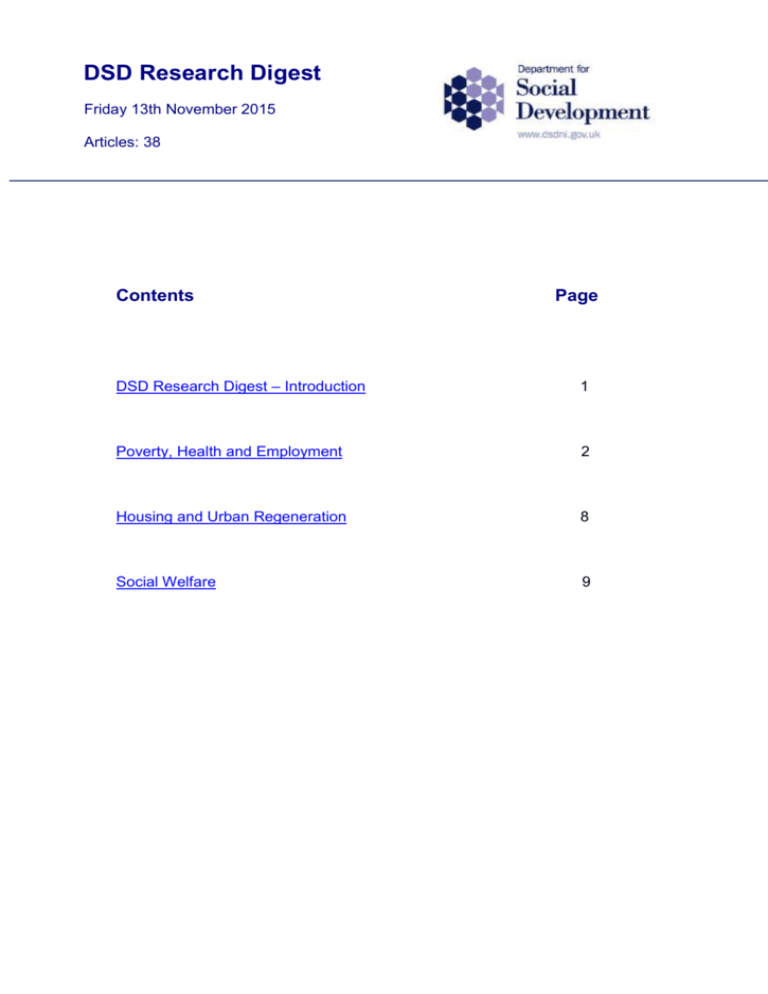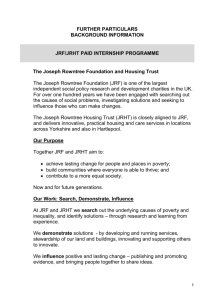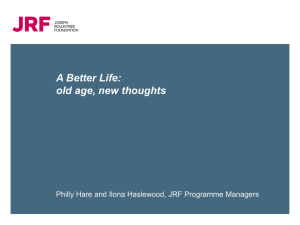DSD Research Digest October 2015 Word
advertisement

DSD Research Digest Friday 13th November 2015 Articles: 38 Contents Page DSD Research Digest – Introduction 1 Poverty, Health and Employment 2 Housing and Urban Regeneration 8 Social Welfare 9 Introduction This is the Research Digest produced for the Department of Social Development. A significant amount of research is published outside of the DSD on issues which may be of interest to DSD policy makers, and this widely-dispersed information can be time consuming to collate. This Digest will compile relevant research reports from across a range of social policy sources and areas of interest. The Digest aims to compile the latest research relating to social development, to help inform policy and practice in the broader strategic areas of Poverty, Health, Employment, Housing and Social Welfare. The digest covers research published mainly in the period from September 2015 to October 2015. Report titles, along with a brief summary of the research (if applicable) and a web link to the report are provided. In the interest of ensuring that business needs are fully reflected, feedback is encouraged and suggestions for future editions are very welcome. Further information on the aims and objectives of the Digest is available in the attached cover note. Enquiries should be addressed to: Kieran McCullagh Analytical Services Unit Level 4, James House, 2-4 Cromac Avenue, Gasworks Business Park, Ormeau Road, Belfast, BT7 2JA Tel: 028 9081 9176 Fax: 028 9081 9961 kieran.mccullagh@dsdni.gov.uk 1 Poverty, Health and Employment 1. What explains the growth in 'never-worked' households? Joseph Rowntree Foundation, September 2015 https://www.jrf.org.uk/report/what-explains-growth-never-worked-households This research investigates what drove the substantial increase in ‘never-worked’ households between 1996 and 2005. The number of homes where no one has ever worked has doubled in little more than a decade. But is this a sign of growing ‘welfare dependency’ or the result of other factors? This report looks at the characteristics of ‘never-worked’ households and considers the possible reasons for the increase. It finds that most never-worked household are lone parent households and younger single people; there is little or no evidence of a problem of ‘intergenerational worklessness’. 2. Ethnicity, poverty and youth employment: improving outcomes for young people Joseph Rowntree Foundation, October 2015 https://www.jrf.org.uk/report/ethnicity-poverty-and-youth-employment-improving-outcomesyoung-people Young people from ethnic minorities are disadvantaged in the labour market. This Solutions paper examines mainstream initiatives that have supported young people’s transitions into work, and sets out recommendations for improving support, offering a more effective route out of poverty. 3. The rise (and fall) of never-worked households Joseph Rowntree Foundation, September 2015 https://www.jrf.org.uk/blog/rise-and-fall-never-worked-households A family in which no-one has ever worked sounds worrying on the face of it. It sparks the idea of long-term welfare dependency, with people spending years or even decades unable, or unwilling, to get a job. The statistics on such ‘never-worked’ households have become a regular part of the ONS release calendar and have been a cause of concern on both the leftand right of the political spectrum. Such concerns were especially the case when the numbers were rising sharply from the mid-1990s until levelling off and declining since 2005. Today, JRF publishes a report from the National Institute of Economic and Social Research, who have investigated these figures in forensic detail to see what is going on and to try to understand a bit more about the rise and fall of never-worked households. 4. Supporting ethnic minority young people from education into work Joseph Rowntree Foundation, October 2015 https://www.jrf.org.uk/report/supporting-ethnic-minority-young-people-education-work Considerable improvements in educational attainment among ethnic minority groups – particularly Black African and Bangladeshi students – have not been matched by sustained progress in the labour market. Local authorities are well placed to address the challenges of unemployment and over-qualification. This Solutions paper suggests recommendations to support education-to-work transitions for ethnic minority youth, drawing on examples of best practice in Bristol, Nottingham and Tower Hamlets. 2 5. Young people and social security: an international review Joseph Rowntree Foundation, October 2015 https://www.jrf.org.uk/report/young-people-and-social-security-international-review Young people’s social security entitlements are changing, including withdrawal of an ‘automatic’ entitlement to Housing Benefit for 18- to 21-year-olds. This report reviews the social security entitlements of young people, and their parents’ responsibilities, in six advanced economies: UK, Australia, Denmark, Germany, Sweden and the USA. 6. Where next for pensioner living standards? Joseph Rowntree Foundation, September 2015 https://www.jrf.org.uk/report/where-next-pensioner-living-standards The Joseph Rowntree Foundation has supported a two-year study into the living standards of future pensioners, carried out by researchers at the Institute for Fiscal Studies (IFS). This round-up brings together the key findings from 11 reports. 7. Low-income parents will both have to work full time Joseph Rowntree Foundation, September 2015 https://www.jrf.org.uk/press/low-income-parents-will-both-have-work-full-time Families with two parents in full-time work, workers without children and pensioners will typically become better off over the next five years due to changes to pay and benefits announced in the Summer Budget, according to new research published today by the Joseph Rowntree Foundation (JRF). The in-depth, independent analysis is the first to take a detailed look at how the measures announced in the Budget will affect people’s ability to afford a decent standard of living. 8. Will the 2015 Summer Budget improve living standards in 2020? Joseph Rowntree Foundation, September 2015 https://www.jrf.org.uk/report/will-2015-summer-budget-improve-living-standards-2020 Since 2008, research on the Minimum Income Standard (MIS) has identified what different household types need for a minimum acceptable living standard, based on what goods and services members of the public say are needed. This study projects the disposable incomes of households on out-of-work benefits and minimum wages, comparing them with MIS between 2010 and 2020. 9. Reducing poverty by promoting more diverse social networks for disadvantaged people from ethnic minority groups Department for Employment and Learning, October 2015 https://www.jrf.org.uk/report/reducing-poverty-promoting-diverse-social-networks There is growing evidence that an individual’s relationships – their ‘social capital’ – can help reduce poverty. For disadvantaged people from ethnic minority backgrounds, there is also evidence of a limited but significant relationship between less diverse social networks and poverty. 3 10. Vacancies: Statistical Factsheet October 2015 Department for Employment and Learning, October 2015 https://www.delni.gov.uk/publications/vacancies-statistical-factsheet-october-2015 This Statistical Fact Sheet, which is published three times a year (along with a more detailed annual bulletin), presents key information on job vacancies which have been notified to the Department for Employment and Learning (DEL) JobCentre/Jobs and Benefits offices (J&Bos). 11. Employment Service Support Statistical Factsheet – June 2014 to March 2015 Department for Employment and Learning, September 2015 https://www.delni.gov.uk/publications/employment-service-support-statistical-factsheet%E2%80%93-june-2014-march-2015 The Employment Service Support (ESS) Statistical Factsheet provides key statistical information on the ESS. Data have been provided on the numbers starting ESS and those assisted into employment. 12. Steps to Work: Quality measurement report Department for Employment and Learning, September 2015 https://www.delni.gov.uk/publications/steps-work-quality-measurement-report This document provides a summary of how the Steps to Work (StW) publications including both the Factsheet and Bulletin adhere to the UK Statistics Authority Code of Practice for Official Statistics and the National Statistician’s guidance on quality. In essence, it sets out how the StW statistical releases are ‘fit for purpose’. 13. Steps to Work statistical bulletin from September 2008 to December 2011 (2011/12) Department for Employment and Learning, September 2015 https://www.delni.gov.uk/publications/steps-work-statistical-bulletin-september-2008december-2011-201112 Data have been provided on numbers participating in Steps to Work, key personal characteristics of participants (such as gender and age), on the Steps to Work strands undertaken within the programme and on destinations after leaving the programme. The statistical bulletins are published in June and December. 14. Transitions into and out of Household Joblessness, 2004-2014 Department of Social Protection (Republic of Ireland), September 2014 http://www.socialinclusion.ie/TransitionsintoandoutofHouseholdJoblessness2004-2014.html This new study measures the movement into and out of household joblessness between calendar quarters during a time of rapid economic change. It also investigates the profile of those in persistent joblessness, and identifies the factors associated with becoming a working household. These are important issues from a policy perspective, so that the needs of all those in jobless households can be addressed and that the numbers affected continue to fall as employment increases. 4 15. Labour Force Survey topic paper – Self-employment Department for Enterprise, Trade and Investment, September 2015 https://www.detini.gov.uk/publications/labour-force-survey-topic-papers Self-employment refers to those who work for themselves. This short topic paper addresses the number of self-employed in Northern Ireland during the last 10 years and describes the characteristics of this group at April - June 2015, as sourced from the Labour Force Survey (LFS). 16. Labour Market Report - September 2015 Department for Enterprise, Trade and Investment, September 2015 https://www.detini.gov.uk/publications/labour-market-report-september-2015 17. Labour Market Report - October 2015 Department for Enterprise, Trade and Investment, October 2015 https://www.detini.gov.uk/publications/labour-market-report-october-2015 18. DETI economic commentary Department for Enterprise, Trade and Investment, October 2015 https://www.detini.gov.uk/publications/deti-economic-commentary The DETI economic commentary provides in-depth commentary and analysis on the latest statistics available for the Northern Ireland economy. 19. Economic Overview Department for Enterprise, Trade and Investment, October 2015 https://www.detini.gov.uk/articles/economic-overview The most up-to-date official statistics on the economy and labour market. 20. Family Resources Survey report 2013 - 2014 Northern Ireland Statistics and Research Agency, October 2015 https://www.dsdni.gov.uk/publications/family-resources-survey-report-2013-2014 The Family Resources Survey (FRS) collects information on the incomes and circumstances of private households in Northern Ireland. It has been running in Great Britain since October 1992, but 2002/03 saw the introduction of Northern Ireland for the first time. This report summarises the results for 2013/14 in which 1,965 households were interviewed. 21. Spending Power: NI worse off than rest of UK BBC NI, ASDA, October 2015 http://www.bbc.co.uk/news/uk-northern-ireland-34604226 http://your.asda.com/system/dragonfly/production/2015/10/20/17_31_42_752_v1_ASDA_inco me_tracker_Oct_2015_2_.pdf Northern Ireland's families remain the worst off in all UK regions, despite an improvement in their spending power. 5 22. Housing and utility bills projected to account for over a quarter of total UK consumer spending by 2020 PWC, November 2015 http://pwc.blogs.com/press_room/2015/11/housing-and-utility-bills-projected-to-account-forover-a-quarter-of-total-uk-consumer-spending-by-2020.html Housing and utilities is projected to be the fastest growing category of consumer spending over the next five years, accounting for over 25% of total UK household spending by 2020. This reflects upward pressure on real rent levels. PwC also projects that the share of total spending in leisure-related areas such as recreation, culture, hotels and restaurants will increase. By contrast, the share of spending on categories such as food and clothing are projected to decline as price competition from online and high street discounters remains fierce. 23. UK Economic Outlook PWC, November 2015 http://www.pwc.co.uk/assets/pdf/uk-economic-outlook-full-report-november-2015.pdf 24. How do landlords address poverty? Joseph Rowntree Foundation, September 2015 https://www.jrf.org.uk/report/how-do-landlords-address-poverty Welfare reforms are reducing incomes and rents are rising faster than wages and benefit rates. How are landlords responding to the challenges of poverty and deprivation among the population? This research examined written strategies from 128 housing organisations, and conducted surveys and interviews with 163, to explore some key areas of practice, including: whether addressing poverty is part of their mission, in principle or in practice; the impact on poverty of decisions over where and what to build, including the use of Affordable Rented housing; rent setting; measures to increase tenants’ incomes and reduce fuel bills and other costs; allocation systems and policies concerning who can access different types of housing. 25. Lifetime opportunities monitoring framework – update report OFMDFM, October 2015 http://www.ofmdfmni.gov.uk/lifetime-opportunities-monitoring-report-october-2015-update.pdf This monitoring framework presents a range of statistical targets and indicators endorsed by the Northern Ireland Executive Sub-Committee on Poverty and Social Inclusion in support of the Executive’s anti-poverty and social inclusion strategy ‘Lifetime Opportunities’. 26. Children and Young People’s Strategic Indicators Report: 2015 OFMDFM, October 2015 http://www.ofmdfmni.gov.uk/index/equality-and-strategy/equalityresearch/researchpublications/esn-pubs/equality-publications-2015.htm A set of strategic indicators was developed under the high level outcomes of the Ten Year Children and Young People’s Strategy 2006-2016 ‘Our Children and Young People – Our Pledge’. 6 27. Households below average income 2013-14 Department for Social Development, September 2015 https://www.dsdni.gov.uk/publications/households-below-average-income-2013-14 This is the twelfth report providing information on Households Below Average Income in Northern Ireland (HBAI NI). This report provides information on potential living standards, as determined by disposable income during the period April 2013 to the end of March 2014 in Northern Ireland. It is the latest in the HBAI Northern Ireland series and is updated annually. 7 Housing and Urban Regeneration 28. Evaluation of Accommodation Based Services Funded by Supporting People Report Northern Ireland Housing Executive, September 2015 http://www.nihe.gov.uk/index/corporate/housing_research/completed/recently_completed.htm This report presents the findings of research undertaken to evaluate the effectiveness of Accommodation-Based Support funded by the Supporting People programme. 29. Tenants’ views of tenancy deposit protection in Northern Ireland Northern Ireland Housing Executive, September 2015 http://www.nihe.gov.uk/index/corporate/housing_research/completed/recently_completed.htm This project was carried out by TDS Northern Ireland in partnership with the Ulster University and was designed to ascertain the views of tenants on the new tenancy deposit protection scheme introduced in Northern Ireland in April 2013. The project aims to establish a baseline against which the success of the tenancy deposit regulations can be judged in future years. 30. Response to Communities and Local Government Select Committee: Housing association sector and Right to Buy Joseph Rowntree Foundation, September 2015 https://www.jrf.org.uk/report/response-communities-and-local-government-select-committeehousing-association-sector-and The ability of housing associations to build and develop is important because the low-cost rented housing they own and manage is a vital means of mitigating and alleviating poverty. The quantity of homes delivered matters, but so too does the affordability of those homes. Current policy is likely to result in a reduction in the number of housing association homes available for rent by those on low incomes. 8 Social Welfare 31. Attitudes and behaviours of self-employed child maintenance clients and barriers to paying child maintenance Department for Work and Pensions, October 2015 https://www.gov.uk/government/publications/attitudes-and-behaviours-of-self-employed-childmaintenance-clients-and-barriers-to-paying-child-maintenance One of the aims of the child maintenance reforms introduced in 2012 was that the Child Maintenance Service (CMS) should be both faster and more effective at dealing with noncompliance than its predecessor. The CMS is also aware of the challenges associated with collecting maintenance payments from non-resident, paying, self-employed parents. This qualitative research explores: why some self-employed paying parents don’t pay child maintenance self-employed paying parent’s views of the (CMS) during the time of the research (November 2013 and February 2014) the communication and support needs of self-employed paying parents when using the CMS 32. Good Relations Indicators Office of the First Minister and Deputy First Minister, September 2015 http://www.ofmdfmni.gov.uk/index/equality-and-strategy/equalityresearch/researchpublications/gr-pubs.htm 33. Wellbeing in Northern Ireland Northern Ireland Statictics and Research Agency, October 2015 http://www.nisra.gov.uk/publications/default.asp14.htm A report updating Northern Ireland data for indicators in the ONS Measuring National Wellbeing Wheel of Measures was published on Wednesday 14 October 2015. It contains the latest UK and NI figures for the ONS wellbeing measures, alongside international comparisons, where available 34. The costs and benefits of paying all the lowest-paid care home workers in the UK the Living Wage Joseph Rowntree Foundation, October 2015 https://www.jrf.org.uk/report/costs-and-benefits-paying-all-lowest-paid-care-home-workers-ukliving-wage This research investigated earnings below the Living Wage for staff in care homes for older people, what the costs and benefits might be, and how this pay increase could be funded. The research also explored the implications of the new National Living Wage and reductions to in-work benefits. 35. The cost of the cuts: a social impact tool for local authorities Joseph Rowntree Foundation, October 2015 https://www.jrf.org.uk/report/cost-cuts-social-impact-tool-local-authorities This user guide introduces a social impact tool which can help councils assess how their saving plans impact on different service users. It comes out of a major research project funded by JRF which has catalogued and explored the implications of local council savings over the past five years. The aim of the project was to analyse the extent to which the range of measures has impacted on poorer groups of service users. 9 36. Departments need to deal with their data gaps if government is serious about tackling inequality CivilServiceWorld.com, October 2015 http://www.civilserviceworld.com/articles/opinion/departments-need-deal-their-data-gaps-ifgovernment-serious-about-tackling The Equality and Human Rights Commission has launched ‘Is Britain Fairer?’, a comprehensive assessment of Britain’s progress on equality and human rights in the last five years. But, a lack of data is preventing public sector bodies from getting the full picture – and could be leaving some groups invisible. 37. The impact of Summer Budget 2015 Department for Social Development, September 2015 https://www.dsdni.gov.uk/publications/impact-summer-budget-2015 This document outlines the Northern Ireland specific impacts of the Summer Budget 2015 policies for benefit claimants in Northern Ireland (including Tax Credit claimants). 38. Mind Your Health -The Physical and Mental Health of Looked After Children and Young people in Northern Ireland OFMDFM, October 2015 http://www.ofmdfmni.gov.uk/index/equality-and-strategy/equalityresearch/researchpublications/esn-pubs/equality-publications-2015.htm The Mind Your Health study is a Queen’s University study, supported by a grant from the Office of the First Minister and Deputy First Minister (OFMDFM). The research study, which ran from May 2012 to April 2015 (three years), set out to profile the health needs of the Looked After children and young people (LACYP) population in Northern Ireland, and to explore how these needs were currently being met. 10








